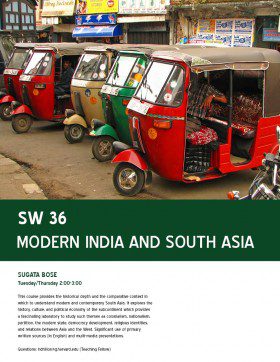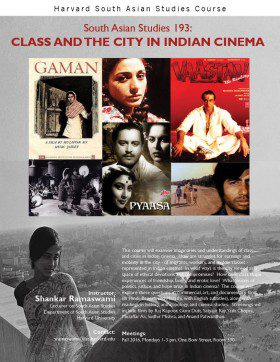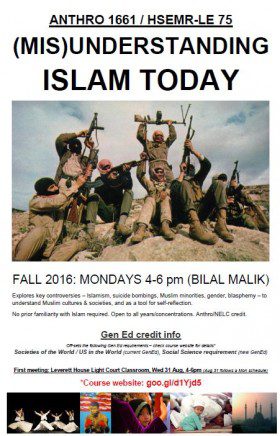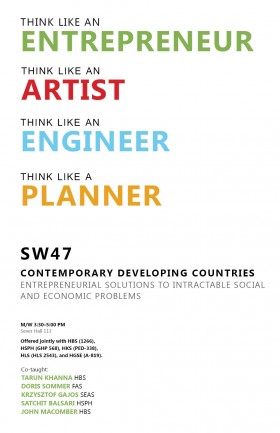 Harvard University will offer many courses with South Asia related content in the fall 2016 semester. (Please note: This is only a partial list. Please visit each school’s individual registrar for a full list of courses.)
Harvard University will offer many courses with South Asia related content in the fall 2016 semester. (Please note: This is only a partial list. Please visit each school’s individual registrar for a full list of courses.)
Do you know of a course that should be listed here? Email Meghan Smith, meghansmith@fas.harvard.edu.
Jump to:
Department of South Asian Studies
Departments in the Faculty of Arts and Sciences
Harvard Graduate School of Education
Contemporary Developing Countries: Entrepreneurial Solutions to Intractable Problems
SOCWORLD 47
Tarun Khanna, Satchit Balsari, Krzysztof Gajos, and Doris Sommer
This course will provide a framework (and multiple lenses) through which to think about the salient economic and social problems of the five billion people of the developing world, and to work in a team setting toward identifying entrepreneurial solutions to such problems. Case study discussions will cover challenges and solutions in fields as diverse as health, education, technology, urban planning, and arts and the humanities. The modules themselves will be team-taught by faculty from engineering, the arts, urban design, healthcare and business. The course will embrace a bias toward action by enabling students to understand the potential of individual agency in addressing these problems. All students will participate in the development of a business plan or grant proposal to tackle their chosen problem in a specific developing country/region, emphasizing the importance of contextualizing the entrepreneurial intervention. The student-team will ideally be comprised of students with diverse backgrounds from across the University.
Offered jointly with the Business School as 1266, the School of Public Health as GHP 568, the Kennedy School as PED-338, the Law School as HLS 2543 and the Graduate School of Education as A-819.
Modern India and South Asia
SOCWORLD 36
Sugata Bose
This course provides the historical depth and the comparative context in which to understand modern and contemporary South Asia. It explores the history, culture, and political economy of the subcontinent which provides a fascinating laboratory to study such themes as colonialism, nationalism, partition, the modern state, democracy development, religious identities, and relations between Asia and the West. Significant use of primary written sources (in English) and multi-media presentations.
This course fulfills the requirement that one of the eight General Education courses also engage substantially with Study of the Past.
Department of South Asian Studies
Economic History of India
SAS130
 Sunil Amrith
Sunil Amrith
The economic transformation of India over the past two decades has been dramatic. The contradictions of this transformation—the juxtaposition of new wealth and enduring poverty—are rooted in the region’s economic history. This research seminar explores many dimensions of economic life in colonial and post-colonial India. Topics include: the history of markets and commodities, property and labor; the history of economic ideas in India; the changing nature of economic and social inequality; and the close relationship between economic and cultural change. Students will write a substantial research paper using primary sources.
Readings in Tibetan Poetics
TIBET 152
Leonard W. J. van der Kuijp
The questions about Daṇḍin’s Kāvyādarśa of Mkhan chen Ngag dbang chos grags’ (1572-1641) and their quotations in Bse tshang Blo bzang dpal ldan’s (1938-) Tshangs sras bzhad pa’i sgra dbyangs.
Gender and the Making of Modern South Asia
SAS 176
Catherine Warner
This course will explore gender history in 20th-century South Asia as well as the methodological importance of history within South Asian gender studies. We will use gender analysis to understand the shaping of nationalism and anti-colonialism, public and private spheres, the state, conflict, popular culture, and the construction of South Asia as a region. Further, we will trace the development of women’s movements and feminisms in modern South Asia. Students will consider how gender intersects with multiple forms of identity while thinking about how South Asia can offer a unique site for theorizing gender in the modern world.
Elementary Tamil
TAM 101A
Jonathan Ripley
An introduction to the oldest of the Dravidian languages of South India, Tamil holds official language status in Tamil Nadu, Singapore, and Sri Lanka. Tamil has one of the oldest uninterrupted literary traditions in the world, ranging from classical love poetry, devotional compositions and epics to the modern novel and short story. Students will be introduced to the Tamil script and to reading, writing, and speaking. Materials from popular culture will supplement modern teaching materials.
 Class and the City in Indian Cinema
Class and the City in Indian Cinema
SAS 193
Shankar Ramaswami
This course will examine imaginaries and understandings of class and cities in Indian cinema. How are struggles for earnings and mobility in the city – of migrants, workers, and middle classes – represented in Indian cinema? In what ways is the city viewed as a space of ethical deviations and compromises? How does class shape experiences of friendship, family, and erotic love? What visions of politics, justice, and hope arise in Indian cinema? The course will explore these questions in commercial, art, and documentary films (in Bengali, Hindi, and Marathi, with English subtitles), along with readings in history, anthropology, and cinema studies. Screenings will include films by Satyajit Ray, Guru Dutt, Raj Kapoor, Yash Chopra, Muzaffar Ali, and Anand Patwardhan.
Elementary Sanskrit
SANSKRIT 101A
Gokul Madhavan
Introduction to Classical Sanskrit, the translocal language of intellectual life in South Asia for much of the last two millennia. This course provides the essential grammar and reading proficiency necessary to take up the language’s many rich literary traditions: scripture (Upaniṣad), epic (Rāmāyaṇa and Mahābhārata), poetry, Hindu and Buddhist philosophy, etc. After completing the textbook, we will read a narrative (Hitopadeśa) drawn from one of the most popular literary works in the pre-modern world.
Advanced Hindi-Urdu
HIND-URD 103AR
Richard Delacy
Continuation of Hindi-Urdu 102; covers topics in advanced grammar; designed to improve proficiency in speaking, listening, reading, and writing.
Introduction to Vedic Sanskrit and Literature
SANSKRIT 204AR
Michael Witzel
Introduction to Vedic grammar. Selection of texts from the Atharvaveda.
Elementary Colloquial Tibetan
TIBET 104AR MWF
Leonard W. J. van der Kuijp
An introduction to spoken standard Central Tibetan: its phonology and basic grammar and syntactic structures – with drill sessions.
Intermediate Classical Tibetan
TIBET 102A
Leonard W. J. van der Kuijp
An intermediate classical Tibetan reading course focusing on the development of translation skills through attention to grammatical and philological analysis. This course will also provide training in the research skills required to work with the Buddhist canonical texts of the Bka’ ‘gyur and Bstan ‘gyur. Readings will be selected from a variety of Tibetan literary genres, including Buddhist philosophy and path literature, as well as historical and biographical narrative texts.
Advanced Poetic Sanskrit
SANSKRIT 200AR
Gokul Madhavan
Selected readings from classical Sanskrit literature.
Advanced Nepali
NEP 103A
Michael Witzel
A reading course in Modern Nepali Literature, suitable for students who have at least three years of Nepali learning. This course is designed to help students understand some of the complex literary materials composed in modern Nepali language. The students will have an opportunity to read a wide variety of selected texts, understand the linguistic systems operative in those writings, and come up with their own informed understanding of them.
The Classical Urdu Ghazal and Its Symbolism: Seminar
HIND-URD 104
Amy Bard
A survey of the popular literary genre including selections from poets such as Wali Dakkani, Siraj Aurangabadi, Mir Dard, Haidar Ali Atish, Mirza Ghalib, and others. Special attention to religious and mystical symbolism.
Back to top of page
Departments in the Faculty of Arts and Sciences
Growth and Crisis in the World Economy
ECON 1490
Dale Jorgenson
The world economy is gradually recovering from the financial and economic crisis that originated in the United States in 2007-2009. Despite the slow recovery of Europe and the U.S., world economic growth has continued at an accelerated pace since the mid-1990s. This is due to very rapid growth of Asian economies, especially China and, increasingly, India. China overtook the U.S. as the world’s largest economy in 2014, while India surpassed Japan in 2012, becoming the world’s third largest economy. The growth of the two Asian economic giants is rapidly transforming the world economy. The ultimate objective of Economics 1490 is to assess the prospects for sustainable growth of the world economy in the future. Will slower growth of the U.S., Japan, and the leading economies of Europe lead to worldwide stagnation or will the accelerated growth of the world economy continue?
Expository Writing 20
EXPOS 20 232
Kip Richardson
The separation of church and state is often considered to be a cornerstone of modern democracy, but this idea has nevertheless been a difficult concept to put into practice. Must the state completely avoid any entanglement with religious groups, or merely act in a non-preferential manner toward them? How does a state determine whether a given belief or practice is religious (and thus deserving of legal protection) or simply ethical or cultural in nature? Is the ideal of a neutral political secularism even possible or desirable? And what should we think of the many global actors, from Latin America to the Middle East to Sub-Saharan Africa, who reject this ideal entirely? This course will consider the many questions and challenges raised by religious diversity for the modern state. We begin in the first unit by considering two influential early accounts of the proper relationship of governments to religiously diverse populations, James Madison’s “Memorial and Remonstrance” and Jean-Jacques Rousseau’s “On Civil Religion.” In the second unit, we will consider several judicial decisions from the U.S. Supreme Court and the European Court of Human Rights, which highlight the contentious legal landscape over the concept of “religious freedom.” Our final unit turns to the international stage to examine several case studies from Brazil, Palestine, Nigeria, and India, to see how religious diversity is shaping contemporary global conflict.
Visualizing the Divine in Ancient Polytheistic Civilizations: Divine Images and Their Worship
FRSEMR 60X
Piotr Steinkeller
This seminar will focus on the modes of representing the divine in the ancient civilizations of Mesopotamia, Egypt, and India. Through the use of rich iconographic data and the relevant ancient texts (in English translation) the members of the seminar will study the ways in which the Mesopotamians, Egyptians, and Hindu conceived of the divine and represented it visually. We will begin by asking what is the meaning of “divine” and “deity” in a polytheistic religious system, and how, in particular, were these two concepts understood in Mesopotamia, Egypt and India; and what makes divine images special and unique, and how do they differ from other types of visual representations. We will then systematically study the ways of representing the divine in the three civilizations in question, and observe how divine images functioned in religious praxis. The seminar will finally consider the issue of iconoclasm as a recurring historical phenomenon: from the Biblical injunction against “graven images,” through the early Christian and Islamic polemics against the use of divine representations, down to the destruction of the “idols” by the Taliban and ISIS in our own time.
Course open to Freshman Students Only
The Problem of Economic Development
FRSEMR 41J
Michael Kremer
Understanding the determinants of the wealth of nations has long motivated the study of economics and it is arguably the most important problem in the field for human welfare. This seminar will examine the problem of economic development, looking both at historical experience and at contemporary issues in developing countries. It will focus on writing in economics, but will also draw on other disciplines, including history, political science, and sociology. The course will start with readings of Adam Smith, Karl Marx, and Max Weber. Participants will then read non-technical works illustrating some of the techniques and modes of reasoning associated with contemporary microeconomics and statistical analysis. Finally, it will conclude with contemporary writing on development, including work that addresses big-picture political economy models of the role of institutions in development, a historical account of India since independence, and more microeconomic approaches.
Open to Freshmen only.
Law and Politics in Multicultural Democracies
GOV 94OF
Ofrit Liviatan
Examines the role of law in the governance of cultural diversity drawing on examples from the USA, Western Europe, India and Israel. Central themes at the intersection of law and politics will be explored, including: the impact of courts on rights protections, law’s function as a venue of conflict resolution, and courts’ relationship with other political institutions. Specific attention will be given to contemporary controversies such as Islamic veiling, abortion and same sex marriage.
Undergraduate seminar. Enrollment by lottery.
Globalization and the Nation State
SOC-STD 98LF
Nicolas Prevelakis
Despite globalization, the nation is still a major actor in today’s world. This course tries to understand why this is so by examining the role that nationalism plays in peoples’ identities and the effects of globalization on nations and nationalism. Examples from the United States, Western Europe, Latin America, India, and the Middle East.
Care of the Soul
HIST 83C
James Hankins
Comparative study of ancient traditions of moral self-cultivation as a way of curing diseases of soul and achieving happiness and moral worth. The traditions considered include Aristotelianism, Stoicism, Confucianism, Mahayana Buddhism, and early Islam. Readings include selections from Aristotle’s Ethics, the Meditations of Marcus Aurelius, Confucius’ Analects, the Bodhicaryavatara of Santideva with the commentary of the Dalai Lama, and The Refinement of Character by Miskawayh. Modern approaches to character formation from the positive psychology movement will also be considered.
Colonial and Post-Colonial Histories of South Asia: Seminar
HIST 2692
Sugata Bose
Analyzes trends and debates in historical research and writing on colonial and post-colonial South Asia.
 (Mis)Understanding Islam Today
(Mis)Understanding Islam Today
ANTHRO 1661
Bilal Malik
This interdisciplinary course, with a Q-score of 4.8, explores key controversies – suicide bombings, Islamism, Muslim minorities, gender, blasphemy – to understand Muslim cultures & societies, and as a tool for self-reflection. Islam and Muslims have increasingly become the subject of various controversies in pop culture, news media, popular imagination, and political debates. Concerns about Islam in this coverage are wide-ranging: terrorism; challenges of Muslim minorities in Western secular democracies; implications of Islamist movements for democratic politics; the status of women within Muslim communities; violent reactions to blasphemy vs. free speech; the social impact of Islamic Law and norms (shariah), etc. In this course, we will bring these topical concerns around Islam into conversation with insights from Cultural Anthropology and other fields, including Religious Studies, History, Government, Philosophy and Law. In short, this course grapples with key controversies surrounding Islam as a point of entry into understanding Muslim cultures and societies today.
In addition to Anthro/NELC credit, this course off-sets the following Gen Ed requirements: Societies of the World / US in the World (current GenEd), Social Science requirement (new GenEd) — check course website for details.
Back to top of page
Introduction to the Hindu Traditions of India
HDS 3404
Anne E. Monius
An introduction to the many distinct yet interrelated religious traditions of South Asia that are often labeled “Hinduism.” This course considers the ways in which Hindus from a variety of historical time periods, local traditions, and social backgrounds have attempted to make sense of their world and their lives within it.
Jointly offered as Religion 1600
Buddhism, Ethics and the Natural World
HDS 3239
Willa Miller
This course explores the relationship between humans and nature, as it has been formulated, expressed and transmitted in Buddhist thought and philosophy over the millenia, and into this current century. Through the scriptures of the Pali Canon, the poetry of of Zen masters, the songs of Tibetan wandering yogis, and the meditations texts of the Tibetan mahamudra tradition, we will consider how notions of nature, the unfabricated and the wild are formulated, how humans interact with nature in those sources, and how concepts of nature both inspire and are informed by Buddhist practices such as meditation and liturgy. We will also look at themes in Buddhist scriptures of ethical formation of the human being—what it means to be a force of moral good in the world. This examination will include grappling with the ways Buddhist theologies resist notions of environmental care, and ways Buddhist communities have failed to protect the planet. In the second half of the course, we will read the works of modern environmental ethicists: Joanna Macy, Gary Snyder, David Loy, Bikkhu Bodhi, Kathleen Dean Moore and others. We will explore how modern ethicists have constructed moral arguments for the preservation of the natural world, and how they have developed practices for religious and activist purposes. Over the course of the semester, we will consider this question: How can we live and perhaps work within a religious tradition while addressing the pressing ethical issues of our time, such as climate change, for the sake of the communities we serve? How do we find inspiration for social change work in and through the scriptures of ancient traditions?
Studying Buddhism Across Time and Place
HDS 3830
Janet Gyatso
This class studies the basic elements of Buddhist thought, practice, and historical communities, and their vision of the nature of human experience and flourishing. We will study Buddhist classic writings as well as later literary gems from South, Central and East Asia on the nature of meditation, discipline, and creativity. Key themes of our readings are the relationship between self and other, the education of the emotions, paths of self-cultivation, and the (im)possibility of perfection. We will be especially attentive to how the approach to such things has shifted as Buddhism spread through Asia, and more recently to the rest of the world, as in its reception by the Transcendentalists, the Beat poets, and socially engaged religion. Throughout the course we will consider the relevance of this material to our own views of the world and how we should lead our lives.
Jointly offered as Culture and Belief 25. For FAS, register in “Culture and Belief” 25.
Intermediate Pali I
HDS 4054
Beatrice Chrystall
This course is the third part of a two-year program designed to allow the student to read Buddhist canonical materials in Pali independently. The readings are taken from the canonical collections and are chosen and arranged thematically, exposing the student to key aspects of the teachings of Theravada Buddhism. The course readings are chosen to enrich the student’s understanding of these teachings, at the same time as strengthening language skills.
Introduction to Buddhist Scriptures and Their Critical Interpretation
HDS 3836
Charles Hallisey
An introduction to basic issues in the contemporary understanding of textuality, history, and interpretation and their relevance to the study of Buddhist scriptures. Examples of Buddhist scriptures will be drawn primarily from the Mahayana traditions.
Jointly offered as Religion 1701
Tibetan Religious Literature: Orality and Performance
HDS 3831
Ian MacCormack
An intermediate to advanced reading class in Tibetan religious literature. This seminar will explore the intersection of religious knowledges about self and world with ritualized public performance. Readings will include speeches and liturgies from Tāranātha, Śākya Chokden, Lochen Dharmaśrī, and the fifth Dalai Lama. The focus will be on the adaptation of Buddhist topics such as the history of dharma, merit-dedication and cosmology to monastic or court contexts. Assignments will be adjusted for various ability levels.
God, Hindu and Christian
HDS 3751
Francis Clooney
This course examines the processes by which theologians study theologies across religious boundaries, bringing this learning into dialogue with home traditions, by careful comparison, dialogical reflection and, ideally, a well-informed theological understanding of what it means to belong to one tradition and learn from another. Readings include (by way of the necessary example) Hindu primary texts and texts from the Roman Catholic traditions, but students are encouraged to bring their knowledge of and interest in other traditions into the discussions. Prior knowledge of either tradition, though desirable, is not required.
Jointly offered as Religion 1059.
Hindu Ethics: Seminar
HDS 3923
Anne E. Monius
An intensive exploration of the place of ethics and moral reasoning in Hindu thought and practice. Materials to be examined will be drawn from a wide range of sources, from classical Sanskrit dharmashastra, epic narrative, devotional poetry, and modern ethnography, but emphasis will be placed throughout upon the particularity of different Hindu visions of the ideal human life.
Jointly offered as Religion 2627.
Political Violence in the Name of God: Holy War, Jihad and Religious Revolution
HDS 3354
Jocelyne Cesari
Everywhere we witness greater tensions and confrontations between religions and the secular principles of the international system. This course will address the following questions: Has secular nationalism failed? Why is religion seen as a legitimate alternative form of politics nationally and internationally? Is there a proclivity to violence from religious extremists? This course will assess the influence of religion on political violence at both the domestic and international level by looking at the theories of war in Islam and Christianity and their resonance with current conflicts in Iraq, Syria, sub Saharian `Africa and South East Asia. Each session will present the evolution of theological positions in different political contexts as well as the ways secular conflicts tend to become sacralized. It will analyze the multifaceted calls to Jihad from Hezbollah or Hamas to ISIS. It will compare religious revolution and religious nationalisms from a Christian and Muslim perspectives.
Back to top of page
Harvard Law School
From Colonial to Post-Colonial: International Financial Institutions, Access to Justice and Human Rights
Dr. Osama Siddique
This course will look at evolving World Bank, European Union, USAID, UK Department for International Aid (DFID), Asian Development Bank (ADB) and other multilateral and bilateral IFI approaches to access to justice, human rights protection and legal empowerment of the poor reforms in selected international jurisdictions, with a particular focus on complex post-colonial contexts like that of South Asia, and in particular Pakistan. The course would explore persistent contestations between free market mechanism strengthening imperatives of the IFIs and the protection of often conflicting (and at times residual, despite the contrary rhetoric) sets of rights such as labor rights, rights of the disempowered and the poor, environmental rights, tribal rights, land rights etc. The course will also examine the nature and continuities of colonial frameworks of governance in South Asia and their influence on post-colonial formal legal systems and experiments with law reform – both indigenous as well as foreign aid funded. It will also discuss recent scholarly and policy literature on ROL reform experiences in the selected jurisdictions as well as a variety of materials from different disciplinary perspectives, including political economy, development, sociology, anthropology, public policy, legal history, and of course law.
Public Interest Litigation and Constitutional Protection of Human Rights: The South Asian Experience
Dr. Osama Siddique
This Seminar would start with an overview of the phenomenon of public interest litigation (PIL) in general and a broad mapping of PIL techniques in selected geographical contexts, while comparing and contrasting it with its counterpart in the U.S.A. The focus would then shift to the structure and nature of constitutionally enshrined Fundamental Rights in South Asian Constitutions (while comparing it with the U.S. Bill of Rights) and the special frameworks and mechanisms for such constitutionally entrenched human rights — particularly in Pakistan, India and Bangladesh — explored and established through the PIL phenomenon. It will continue with an exploration of the different trajectories followed in these countries over the decades as PIL became more politically contested and judges realized the limitations of getting involved in political, policy and governance arenas. It will generate discussions over the increasing use of informal, relaxed and special procedures for rights protection in PIL as well as growing use of controversial features such as the suo motujurisdiction. Additional themes of discussion will include the deliberate as well as inadvertent embroilment of courts in mega-politics, the consequent phenomenon of judicialization of politics and its consequences for the actual and perceived protection of Fundamental Rights by the courts as well as the sustainability of constitutional democracies. Also examined will be the experiences of individual and NGO led human rights activism in key areas of rights protection given the aforementioned history, politics, sociology and framework of judge driven PIL (which ought to be of interest to anyone analyzing and/or contemplating activism in other contexts).
Urban Governance and the Politics of Planning in the Developing World
SES 5502
Diane Davis, Enrique Silva
This course starts from the premise that urban politics and governance arrangements shape the definition, form and practice of planning and therefore its outcomes. Using a focus on cities in the developing world, the course examines an array of governance structures (centralized versus decentralized institutions; local versus national states; participatory budgeting, etc.) and political conditions (democracy versus authoritarianism; neoliberal versus populist versus leftist party politics; social movements) that are relatively common to cities of the global south. In addition to assessing the impacts of these structures and conditions on urban policy formation and implementation, the course asks which governance arrangements and/or political contexts are more or less likely to produce equitable, inclusive, and sustainable urban environments. To address these questions, the course is structured around a comparative analysis of theories and cases that give us the basis for documenting the ways that politics affect urban policy and the built environment of the city more generally. The course’s critical approach to case studies and policy prescriptions will also prepare students to formulate relevant planning strategies in the future. Among a range of policy domains, special attention is paid to transportation, housing, mega-project development, municipal financing and disaster mitigation, with most examples drawn from Latin America, South Asia, and East Asia.
Harvard Graduate School of Education
Education Policy Analysis and Research in Comparative Perspective
Fernando Reimers
EDU A801
How can policy leaders, international consultants, and social entrepreneurs help improve educational opportunity around the world? How can we help poor and marginalized children get a decent education, and how will that matter to their future life prospects and to the development of the societies in which they live? This course examines key contemporary educational global challenges and debates, focusing on options to effect systemic change in public education systems. We will discuss current global efforts to provide quality education and increase its relevancy. We will examine the role of international agencies and governments in advancing policy reform, and study various approaches to generating and analyzing policy alternatives. The course may be of interest to students interested in global and international education and in comparative education.
Back to top of page
Energy Policy: Technologies, Systems, and Markets
IGA 410
Henry Lee
Energy is a critical component of every dimension of human society. It is an essential input for economic development, transportation, and agriculture, and it shapes national and international policies in the environmental, national security, and technology arenas. IGA-410 introduces students to the policy and economic dimensions of the energy choices to meet societal goals — both global and domestic. Oil and gas markets, electricity policy, technology innovation, renewable energy, climate change and global energy politics will be covered, as well as the energy challenges facing India and China. The first part of the course introduces students to quantitative and qualitative analytical tools to assess energy problems and the fundamental concepts of energy policy. The second will use case studies to explore specific challenges, which will allow students to apply the tools acquired in the first segment.
Great Power Competition in the International System
IGA 116
Nicholas Burns
This course will focus on the future balance of power in the world and cooperation as well as competition among the 21st Century Great Powers. We will study the rise of China, India and other rising powers in the decade ahead and assess whether these countries are prepared and willing to lead effectively. We will look closely at the changing nature of American power. In addition, we will focus on the relationship between the United States and China and their likely competition for strategic influence in the Asia-Pacific region. We will also investigate whether the Russian Federation and European Union will be more or less influential in the future. The major objective of the course is to reflect on how this group of countries and other regional powers can work together to address some of the principal challenges of the new century including on climate change, avoiding conflict in the South and East China Seas, limiting nuclear proliferation, enhancing cooperation on energy, and dealing with the dilemma of intervention in regional wars worldwide.
Global Justice
IGA 107M
Kathryn Sikkink
This class will use a global justice approach to help us explore and address practical policy questions. A global justice approach stresses fairness, political and economic equality of both opportunity and outcome, and accountability. It can refer to equality among countries as well as among people. In this module, we will consider the multiple meanings of global justice, and use case studies to examine specific issues, from chronic malnourishment to gender violence, in terms of these different understandings of justice. Using what Amartya Sen calls a “realization-focused comparative approach” we will scrutinize global policies to try to arrive at some agreement on the injustice of certain practices or outcomes relative to others. On justice as accountability, we will examine the increasing practices of holding both state and non-state actors accountable for violations of core human rights. We will explore different forms of inequality as a key form of injustice, including economic, racial, and gender inequality. We will ask about the justice implications of an increase in equality among countries, as with the economic and political rise of countries such as China, India, and Brazil, when it is accompanied by an increase of economic inequality within countries. Because the course is a module, it will provide more of a gateway or introduction to the topic that could later be deepened through other courses at HKS.

